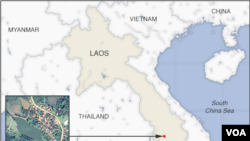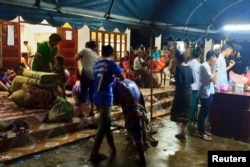At least 19 people have been confirmed dead in the wake of Monday's catastrophic dam collapse in southern Laos that left thousands of residents homeless and hundreds more missing.
The Xepian-Xe Nam Noy dam collapsed in the southeastern province of Attapeu late Monday, releasing as much as five billion cubic meters of water throughout the district, washing away hundreds of homes and leaving scores of residents homeless.
State news agency KPL put the number of displaced downstream from the dam, located about 550 kilometers south of the capital, Vientiane, at 6,600.
South Korean President Moon Jae-in has ordered an emergency relief team to Laos to assist with the recovery efforts. Two South Korean firms, SK Engineering and Construction and Korea Western Power, are part of a consortium building the 410-megawatt project, along with Thailand’s Ratchaburi Electricity Generating Holding Company, and Lao Holding State Enterprise.
The Xepian-Xe Nam Noy dam was set to be completed next year is at an estimated cost of about $1 billion.
Just hours before the disaster on Monday night, the consortium warned in a letter that millions of tons of water would surge down the Xe-Pian River if the dangerously unsafe dam failed.
“And within hours of this letter in the evening, the dam did actually break. So it’s clear that the warning system appears to have been inadequate and appears to have been too late for many people,” Maureen Harris, Southeast Asia director at International Rivers, told VOA.
Thousands of people have been displaced downstream from the dam, one of five that make up the Xe-Pian-Xe-Namnoy dam cascade project on the Bolaven Plateau, Harris said.
In their warning letter, the consortium, known as PNPC, said the saddle dam had become unsafe due to heavy rainfall and would release five million tons of water into the Xe Pian River if it failed. The project reservoir is intended to rise 73 meters high by 1,600 meters long, with the capacity to store about 1,043 million cubic meters of water.
The dam "was fractured, and the water had leaked to the downstream area and down to the Xe-Pian River, which is about five kilometers from the dam," said Kijja Sripatthangkura, chief executive officer of Ratchaburi Electricity Generating Holding Company.
The Laos Ministry of Natural Resources and Environment has not responded to Voice Of America inquiries, while the Mekong River Commission, the MRC, said it was investigating the disaster and would comment Wednesday.
Videos and photos posted to Facebook by state media showed huge areas inundated and people stranded on the roofs of their flooded houses. Prime Minister Thongloun Sisoulith is pictured visiting the affected area.
The Xe-Pian-Xe-Namnoy dams flow down into the Sekong River through Cambodia, and there are concerns of potential downstream impact.
Water levels across the Mekong region have been rising rapidly since July 15, in one case by more than four meters in the Laotian city of Luang Prabang, due to extremely high rainfall caused by tropical Storm Son-Ting, according to the MRC.
Harris said the incident raised concerns about the risks around dam designs unable to cope with extreme weather events exacerbated by climate change, and the adequacy of warning systems, including for dams currently under construction.
More than 70 dams are currently under construction or planned in Laos, including several on the Mekong mainstream. Harris said the roles and responsibilities of private companies developing these projects should be seriously questioned, in light of the disaster.
VOA Laos contributed to this article.






